
THE VOICE OF INTERNATIONAL LITHUANIA
|
VilNews has its own Google archive! Type a word in the above search box to find any article.
You can also follow us on Facebook. We have two different pages. Click to open and join.
|
Author Archive
- Posted by - (0) Comment
Lithuania’s European Presidency
It’s an honour!
|
Lithuania will hold the Presidency of the Council of the European Union in the second half of 2013, starting from the 1st of July. VilNews has on this background asked readers to annotate and analyze factors that have to do with Europe, the EU, the euro and Lithuania. This is one of the posts we have received. An article by Dr. Rimas Slavickas |
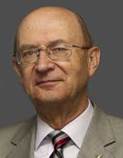 Dr. Rimas Slavickas |
It is an honour for such a small country like Lithuania to fulfill the role of EU Presidency. By accepting this responsibility to diligently fulfill this task may further enhance EU’s unity to be as ‘one’, yet retaining the strengths, resiliencies and differences of autonomous ‘individual nations’ with their own respective historical identities. Lithuania has an opportunity, during its tenure, to raise the European bar – standards, even higher by setting examples for others to follow. The further pursuance of practical ideals and solutions which include government and economic stability, wrapped in democratic principles of justice, freedom of expression and human rights would provide even a greater global attention and exposure for both EU and Lithuania. Namely, by setting aside human frailties of individual self serving political esteem and associated benefits and thereby provide a perception of greater national unity and strong leadership to further enhance the positive moral direction by affectively addressing European challenges. Such efforts would be globally recognized that integrity, sincerity, goodwill and determination of purpose, even from a relatively small nation, can achieve much. This attribute is especially relevant to Lithuania which historically has seen many years of political turmoil, world wars and more than half a century of suppressed occupation and yet has retained its rich cultural heritage, religious beliefs and basic democratic principles. Such national determination initiated the ending of the official Soviet system and today stands out to others as an example of perseverance and that ‘it ‘can be done’, irrespective of the magnitude of the perceived challenge.
Therefore, let the Lithuanian decision makers brace themselves to this privileged task and recognize that this tenure is not only a challenge but also an opportunity to help both the EU concept and also the Lithuanian nation. The strengthening of the idealistic concepts of European Union would also enhance Lithuania’s global credibility and fundamental concepts of national unity abroad and at home.
- Bookmark :
- Digg
- del.icio.us
- Stumbleupon
- Redit it
- Posted by - (1) Comment
Lithuania’s European Presidency
It’s an honour!
|
Lithuania will hold the Presidency of the Council of the European Union in the second half of 2013, starting from the 1st of July. VilNews has on this background asked readers to annotate and analyze factors that have to do with Europe, the EU, the euro and Lithuania. This is one of the posts we have received. An article by Dr. Rimas Slavickas |
 Dr. Rimas Slavickas |
It is an honour for such a small country like Lithuania to fulfill the role of EU Presidency. By accepting this responsibility to diligently fulfill this task may further enhance EU’s unity to be as ‘one’, yet retaining the strengths, resiliencies and differences of autonomous ‘individual nations’ with their own respective historical identities. Lithuania has an opportunity, during its tenure, to raise the European bar – standards, even higher by setting examples for others to follow. The further pursuance of practical ideals and solutions which include government and economic stability, wrapped in democratic principles of justice, freedom of expression and human rights would provide even a greater global attention and exposure for both EU and Lithuania. Namely, by setting aside human frailties of individual self serving political esteem and associated benefits and thereby provide a perception of greater national unity and strong leadership to further enhance the positive moral direction by affectively addressing European challenges. Such efforts would be globally recognized that integrity, sincerity, goodwill and determination of purpose, even from a relatively small nation, can achieve much. This attribute is especially relevant to Lithuania which historically has seen many years of political turmoil, world wars and more than half a century of suppressed occupation and yet has retained its rich cultural heritage, religious beliefs and basic democratic principles. Such national determination initiated the ending of the official Soviet system and today stands out to others as an example of perseverance and that ‘it ‘can be done’, irrespective of the magnitude of the perceived challenge.
Therefore, let the Lithuanian decision makers brace themselves to this privileged task and recognize that this tenure is not only a challenge but also an opportunity to help both the EU concept and also the Lithuanian nation. The strengthening of the idealistic concepts of European Union would also enhance Lithuania’s global credibility and fundamental concepts of national unity abroad and at home.
It is my sincere hope that through this governance process, during and after Lithuania’s term has expired, the experiences gained and results obtained will include a greater recognition, by all Lithuanians, the importance of political unity and greater national bonding. That also political leaders and other Lithuanians of national influence will gain a greater recognition of the importance of differentiating between what is essential and what is not and what should change and what should remain the same in both the short and long term national best interest.
Such comprehensive endeavours would provide a further stimulus for Lithuanians to better understand their obligations and more effectively address the many challenges within and outside this relatively small, yet very gifted Baltic country. Therefore, irrespective where we reside or are separated by either large or small geographical distances and irrespective with what accent we speak, nevertheless as Lithuanians and associated descendants, let us all boldly and passionately support this undertaking.
Therefore at the end of Lithuania’s EU presidency, the judgement should not be a polite whisper by some but boldly proclaimed by all:
“WELL DONE LITHUANIA!”
Dr. Rimas Slavickas
Director
Energy Infrastructure and Partnerships
Power Center for Utility Explorations
Department of Electrical Engineering
University at Buffalo
332 Bonner Hall
Buffalo, NY, 1420-1920
Direct: 905 – 735 – 5600
Can. Cell: 905 – 932 – 5127
USA Cell: 716 – 361 - 7570
Office: 716 – 645 – 1052
Email: lpa@collaborative-research.com
http://www.eng.buffalo.edu/Research/PCUE/PCUE/Home.html
Vice President
Energy Initiatives and Collaboration
Global Energy Institute
Buffalo Niagara Medical Campus Innovation Center
640 Ellicott St
Buffalo, NY, 14203
Direct: 905 – 735 – 5600
Can. Cell: 905 – 932 – 5127
USA Cell: 716 – 361 - 7570
Office: 716 – 645 – 3064
Email: lpa@collaborative-research.com
http://www.bnmc.org/energizebnmc/global-energy-institute/
- Bookmark :
- Digg
- del.icio.us
- Stumbleupon
- Redit it
“If you seek wisdom, Vilnius is the place to go”
- Posted by - (0) Comment
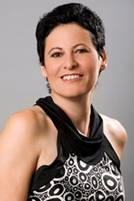 |
Adv. Marcelle Juliet Saul Sheiman, an attorney to the Supreme Court of the Republic of South Africa and Israeli advocate, who attended the World Lithuania Economic Forum in Vilnius earlier this month. Marcelle Juliet Saul Sheiman (MS) currently serves as Chairman of the Israel-South Africa Chamber of Commerce. |
South African attorney Marcelle Juliet Saul Sheiman:
Lithuanian Impressions 2010
15.05.2010
I am in Lithuania now and described my thoughts last night when I went along to the Shabbat dinner hosted by the Vilna Chabad Rabbi Krinsky: ones of belonging and identity.
I described these thoughts and feelings to the guests there - a community of English Jews who came as part of Jewish Journeys, a Canadian Rabbi and his wife, the Israeli now living in Lithuania and studying at its universities, and to the very elderly community members who were there (a meager amount of people). This followed the short lecture by the Rabbi as to Shavuot, and numbers - and how people were and are counted and the meaning of numbers in our life. He spoke of the being part of the Jewish people and how some no longer want to be a part of it and of the many dead.
I started telling the people about my feelings on landing in Lithuania – one of sadness in what was – the rise and fall of Yiddish civilization and how much had been and how many had lived and then also the feeling of belonging, something in me of belonging here. There was a part of me that was here.
I also very much felt a sense of belonging that night – interestingly enough juxtaposed to what was expressed by one person – his sense of alienation in Lithuania.
- Bookmark :
- Digg
- del.icio.us
- Stumbleupon
- Redit it
- Posted by - (1) Comment
“If you seek wisdom,
Vilnius is the place to go”
 |
Adv. Marcelle Juliet Saul Sheiman, an attorney to the Supreme Court of the Republic of South Africa and Israeli advocate, who attended the World Lithuania Economic Forum in Vilnius earlier this month. Marcelle Juliet Saul Sheiman (MS) currently serves as Chairman of the Israel-South Africa Chamber of Commerce. |
Adv. Marcelle Juliet Saul Sheiman: Lithuanian Impressions 2010
15.05.2010
I am in Lithuania now and described my thoughts last night when I went along to the Shabbat dinner hosted by the Vilna Chabad Rabbi Krinsky: ones of belonging and identity.
I described these thoughts and feelings to the guests there - a community of English Jews who came as part of Jewish Journeys, a Canadian Rabbi and his wife, the Israeli now living in Lithuania and studying at its universities, and to the very elderly community members who were there (a meager amount of people). This followed the short lecture by the Rabbi as to Shavuot, and numbers - and how people were and are counted and the meaning of numbers in our life. He spoke of the being part of the Jewish people and how some no longer want to be a part of it and of the many dead.
I started telling the people about my feelings on landing in Lithuania – one of sadness in what was – the rise and fall of Yiddish civilization and how much had been and how many had lived and then also the feeling of belonging, something in me of belonging here. There was a part of me that was here.
I also very much felt a sense of belonging that night – interestingly enough juxtaposed to what was expressed by one person – his sense of alienation in Lithuania.
I may go the synagogue tomorrow. I land up doing things that I did so many years ago and am not sure of the fit anymore. How does this relate to how I am feeling today, personally? It feels strange to know that there is a time for everything, maybe because I always felt timeless. There is a time for everything and there is timelessness to everything and that includes a time to live and time to die. Who makes that choice? In what way are we G-d’s messengers and in what we do, G-d’s will? Is everything G-d’s will? Even the greatest of horrors? And then how can they be horrors?
I spoke of souls to the Rabbi last night – that I believe that when Jewish souls get too many, something happens to the Jewish people, and that our strength lies not in numbers. Everything is as it is meant to be. I question this place then of free choice and then there is this place of natural - of no decision – not to do and not not to do – where it simply is. [Maybe that is the place of free choice]. That is the feeling that I have now – is it the empty, or is it the missing? Is it the abundance or the lack thereof? There is no sense to anything in the literal meaning of sense.
IT IS SOMETIMES SO DIFFICULT TO KNOW THAT EVERYTHING CAN BE – probably because then we realize just how powerful we are - that our thoughts do create our reality; that things can lead one way or another based on our thoughts; and that we are the creators of our thoughts and lose touch with what is natural. But if our thoughts guide our reality, then anything can be so why is there so much suffering? Is it because we resist? resist what? How do our thoughts and its influence on reality have anything to do with G-d?
What is the natural way of things?
I looked at the Rebbitzin last night . She looks young, people say and she has 10 children. She is probably younger than me. I see her beautiful children. When I said to the Rabbi – wow you have 9 children (as I thought) he said – 10, but who is counting. I remember and recalled for him the story of the Palestinian woman whom I met and who was called Enough.
++++++++++++++++++++++++++++++++++++
I went to the Choraline Synagogue yesterday (Shabbat) – the only synagogue left standing in Vilna. I started off my day by going into the Vilnius cathedral, a huge white marble cathedral opposite my hotel. I then walked down the streets on the way to the synagogue. Magnificent little coffee houses and medieval architecture and then arrived at the Gates of Dawn - very ornamental, gold, Christian - making my way through them to another part of the world it seemed. A part that is old, decrepit and run down, in the direction of the synagogue. It had locked gates but I managed to get in with the help of an elderly man that was also entering. There is a bell though.
I took a prayer book and sat down in the section separated for women by a lace curtain. I started praying and crying – an overwhelming feeling of being in a place which in my imagination had been filled with so many people. I could imagine my family and then - all of them being killed. Maybe herded in this shul before being taken off somewhere to die. Life and death together. I could feel the death so palpably interwoven with the life.
The Cantor's wife - came to talk to me. She had on what seemed to be a beautiful short wig. She struck me more like a beautiful doll. She told me of herself, her family. Whereas the Chabad rabbi had told of 1000 people at his Seder, she tells me of the dying community - mostly assimilated or very old. There are these two old women praying in the Shul. They must be in their 80’s. they must have been very beautiful and still seem as such – blond but with hunched backs and walking sticks. I wish them Shabbat Shalom and they smile at me through their toothless mouths. There is also this Rabbi (brought in from outside the community) with a menacing look - a huge beard and everyone seems to be a bit frightened of him. He peers through these round rimmed spectacles and rants and raves in the Shul. I walk on through the Jewish quarter with the UK crowd of people I met Friday night at the Chabad rabbi. We are doing a walking tour - the one concentrating on the life that was – the Vilna Gaon, the scholastic dynasty. Later on a tour will be taken in the same parts - the ghetto and the Holocaust. The Rabbi who is guiding the UK troupe on its Jewish journey says that it is very confusing to do the Life and Death parts together. I leave them after a while to go off to Trakas castle on my own.
++++++++++++++++++++++++++++++++++++++++++++++++
I take a guided tour to Trakas on Saturday afternoon. The guide, a young Lithuanian woman is amazed to hear that as a Jew from South Africa and now in Israel, I had grandparents born in born Kovna (Kaunas) and Ponevys. On the way to this beautiful castle we pass Ponerai. There is such beautiful countryside, farms, trees amidst the difficult pictures I have in my mind.
+++++++++++++
16.5.10
This is a beautiful country – they look like cherry blossoms on the trees, I think they may be apple. And then the little beginnings of pines. Everywhere. A land soaked with blood. It is a big country here – once spreading from the Baltic to the Black sea. There is a declining population and it has a different energy to the one I know in Israel. The Jewish community is also dead.
+++++++++++++
17.5.10
I went for a walk this morning to find the Green House. I eventually found it, confusing it originally with the Museum for Genocide Victims, based on Russian atrocities on the Lithuanians during their occupation. I walk up a small hill and make my way there through a 7 roomed little house. You ring a bell and a woman answers. The first exhibit that strikes me is an excerpt from the “Jaeger report”. I copy it down:
Secret Reich Business:
I consider the Jewish action more or less terminated as far as Einsatzkommando 3 is concerned. Those working Jews and Jewesses still available are needed urgently and I can envisage through the winter will be required even more urgently. I am of the view that the sterilization programme of the male worker Jews should be started immediately so that reproduction is prevented. If despite sterilization a Jewess becomes pregnant, she will be liquidated.
Today I can confirm that our objective to solve the Jewish problem of Lithuania has been achieved by EK3. In Lithuania, there are no more Jews apart from Jewish workers and their families.
These total: In Schaulen c4,500
In Kauen c15,000
In Wilna c15,000
I copy down other references to Stahlecker ‘s Reich secret document on Jews. A poem – Never Say by Hirsh Glik. A reference to a book by Solly Ganor – Light One Candle. Rabbi Ephraim Oshry’s - The Annihilation of Lithuanian Jewry (translation by Y. Leiman).
I have come to the museum although I did want to follow the life of the Jews not so much for their deaths as for their life. But I find them so inextricably interwoven in this place. I read a letter from a woman to her brother in South Africa just before she and as she says – her babies are going to be killed. She is writing to her brother and tells him that her husband has been killed and now she and her children are about to be killed. She asks for blood to be avenged. I read and write various things and some are too sickening to read, so I don’t. I exit the museum and am met by the Cantor's wife. She is in pants this time and dons that beautiful - what seems like – coiffed wig. She takes me home - we meet her husband who is on the way out to get a cucumber for our meal. We walk up the stairs and she kisses the Mezuza on the inside of the house. Don’t you have mezuzot on the outside of the door - No she says – it is too dangerous. Even her husband wears a cap and not a skullcap. His beard also sometimes arouses speculation. He comes home and we talk. I ask him why he still lives here. He is from Minsk. He tells of his wife’s elderly parents but this is not the only reason – he belongs here he says. In this place where the Vilna Goan and a thriving Jewish community lived. It is not always necessary to follow the Kehila he says, even though living amongst a Kehila is also important. There are only old Jews here he says - they come to Chabad and to the synagogue for help. The rabbi who I described already - he says - comes to take the services.. This Cantor is a man who opens the heavens with his singing and comes from generations of Hazans.
We speak of Israel and I mention the calling for our spirit as Jews. And he quotes from psalms – a piece which reiterates the sentiment that the Jewish spirit is the shtetl Jew and we sit and talk and I eat. Would you believe.. Herring, Chopped Herring - just as I know it is made – with apple, and onions and eggs. It feels like home. His wife has set us a feast of chopped herring, bread, cheese, eggs for me, coffee and for me especially she brings out the Amarula – South African liqueur. She accompanies me back to the hotel, past a few more of the forgotten Jewish sites. I tell her that I learnt there was only one tree in the Ghetto – I wonder where that tree is?
I find myself attracted to her vivacity, her liveliness and that of her husband. I am Lithuanian, a Lithuanian Jewess it feels. I don’t feel loved and am wary of being the outsider but in many ways as with the Cantor, we belong.
19.05.2010
I wake up this morning with a frightened feeling. This is not Vilna, this is Kaunas - Kovna for me. This is what the guide on Saturday called the dead place. The bus ride to Kaunas brings me to a station which is replete with older cars, townspeople, something that reminds me of the towns or other cities in South Africa – not Johannesburg. There is even one man dressed in complete Russian soldier attire. It really feels strange – I see lots of open spaces, greenery, places where I have a sense one could have hid a lot of bones. My imagination.
What was here before? I want to be able to trace back the life and I feel frightened because somehow I feel alienation here [Yet from my few experiences since arriving here, the people appear friendlier than in Vilna]. Then I sit down at breakfast and in another moment I taste the way the omelets are made and I want to tell my father that no wonder he makes such great eggs. He obviously must have learnt that from his father. Does he remember what he ate way back when he was a little boy. Maybe his dad cooked for him. I have to learn to make omelets the way they do here.
I walked quite some way yesterday just to find and then touch some vestige of Jewish life. I come to the Synagogue. The gate is open and I ring the bell. A man who speaks Yiddish lets me in and I take pictures. I am reminded of the Jewish rivalries between the various synagogue factions and am told that “Kalmanowitz” you know, the mafia one from Moscow who was killed, is/ was a part of this synagogue. My "Zeida" on my father’s side was an atheist and a communist, a “difficult” man who was at once, a great artisan being able to carve the most beautiful pieces of wood and at same time, a man who could kill to protect his family. I think at once of the Jews. Those people of whom the Baal Tefila spoke. And I realize just how strong these Jews were. They were educated and strong in spirit. Who has the audacity to say that they went like sheep to the slaughter. Are these the same Jews that have guns and tanks – not that we shouldn’t have guns –– but there is strength in spirit.
I think of modesty and realize the gift of simplicity and modesty. Something it seems I have forgotten or with which I am not in touch in my milieu. Too much money, big houses. This place seems denuded of money. It is very much country. I think of my yesterday’s reading up on the flag of Lithuania – Yellow, Green and Red. The colours of the Lithuanian flag – Yellow, green and red – represent sum, light and prosperity; the beauty of nature, freedom and hope; and earth, courage and blood shed in defending Lithuania’s independence. At the moment it has been only green and red for me.
Vilnius – some excerpts:
Before WWII there was a saying among European Jews: if you are keen on earning money, go to Lodz; if you seek wisdom, Vilnius is the place to go.
“I live in this city with a feeling that it does not belong to me and that I have only come here for a visit – as a human being, a poet and a Lithuanian. In this respect Vilnius could be compared only to Jerusalem. Only Jerusalem is the city of G-d, whereas Vilnius is the city of a dream. Trivial as it might seem, it was founded after Gediminas has a dream. It’s as if Vilnius was not created by man – you have the feeling that Vilnius has risen from the ground, from the confluence of the rivers, from the landscape – it rises on its won, possibly with some support by man. It is also in the details that the beauty of Vilnius lies. On the one hand, the Vilnius of the dream lets its citizens merely touch it; on the other hand, Vilnius sucks them in and swallows them”
AIDAS MARCENAS poet
Market day in Vilnius
The soul of a bearded Jew
Is weighing memory
SIGITAS PARULSKIS
POET and WRITER
There is only one Jewish house of prayer in Vilnius at present. Not too long ago, however the Lithuanian capital was called ‘a city of a hundred synagogues’. On the even of WWII, Vilnius, which was then called the Jerusalem of Lithuania, had over 110 Jewish houses of prayer, the majority of which were destroyed during the war.
“I sometimes think that Vilnius was invented by a jolly maiden, that it is a dream she dreamed about – the flood, the boats, the two rivers, the mountain and the temples, lots of temples and little streets.
In the evening, when people disperse into their homes, and darkness walks the streets of Vilnius, I see how, in the shelter of their sleeping houses, their dreams alight – the dreams about something different, about how good it would be if it could be. Wrapped in silence, the streets of Vilnius… are dreaming.
Vilnius speaks with every stone of its cobble roads, every window bathed in soft light at night, every roof of a church, the happy laugh of students: once we were here, it was here that we that we were happy and sad, we built, we searched, we lost and found our path again. I myself am dispersing into the streets and the faces of passerby, I start flickering among the leaves of trees in the park and become a tiny part of the big dream of Vilnius…
They say that there are no stairs to heaven. Yet I can feel them here. Oftentimes in a narrow land, an old courtyard, in the glance of a passerby, in the sweet aroma of fresh bread rolls lingering in the air after the bakery opens in the morning. Sometimes autumnal leaves brush against them gently and whirl upward to our cherished dreams.”
- Bookmark :
- Digg
- del.icio.us
- Stumbleupon
- Redit it
- Posted by - (0) Comment
90% of all Jews in
South Africa are Litvaks
Text and photos: Aage Myhre
It is considered that around 90% of the approximately 80,000 Jews living in South Africa are of Lithuanian descent (the so-called Litvaks), which thus constitutes the largest pocket of Litvaks in the world! You are hereby invited to learn more about this unique Jewish community that still holds Lithuania alive in their hearts, museums and synagogues.
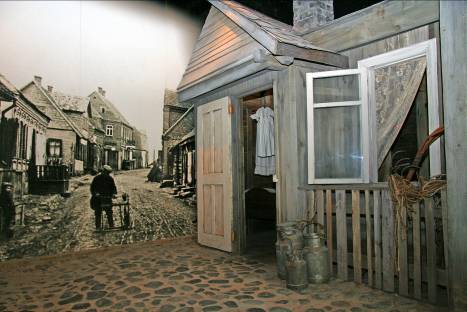
The Jewish Museum in Cape Town is more Lithuanian than Lithuania itself.
The Jewish Museum in Cape Town offers visitors a journey back in time. Most museums do. The striking feature of this museum, however, is that the journey to the past also brings us to a completely different part of our world, from Africa's southern tip to a seemingly modest little country far to the north, to a country where around 90% of South Africa's Jewish population has its roots (there are today about 80,000 Jews in South Africa).
The museum's basement is dominated by a village environment (shtetl) from the late 1800s. A few houses are reconstructed in full scale, and you can clearly see how people lived and co-existed at the time. The village is called Riteve. It was recreated in the museum on the basis of entries made in the 1990s by a group of experts who went from South Africa to Lithuania to find traces of the family of the museum's founder, Mendel Kaplan.
The village is called Rietavas in Lithuanian. It is there to this day, less than a half hour drive from Klaipeda, at the highway direction Kaunas and Vilnius. The Kaplan family emigrated from here in the 1920s, while the village's population was still 90% Jewish. Today, no Jews live in Rietavas.
- Bookmark :
- Digg
- del.icio.us
- Stumbleupon
- Redit it
Sad fate of wooden synagogues in Lithuania
- Posted by - (0) Comment
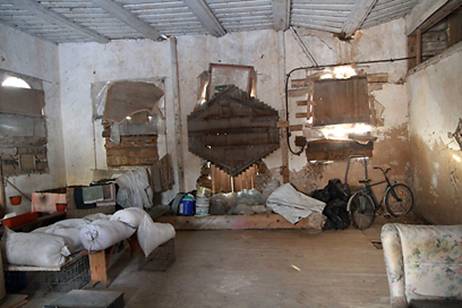
Inside of former synagogue. Used for storage (Photo: AFP)
Lithuania's wooden synagogues, the vestiges of a Jewish presence which was wiped out in the Holocaust, are falling into ruin from a lack of funding and support.
Hidden behind a row of houses, the wooden synagogue in the eastern town of Alanta looks more like a barn than a former house of worship.
This rundown building, which served as a fertilizer warehouse during the days of state farms, is now used for storage by Algis Jakutonis, a farmer living next door.
"I store my stuff there, and we still find traces of the Soviet era," said the 60-something Jakutonis, while displaying the large iron key to the former synagogue, which he acquired before Lithuania's independence in 1990.
- Bookmark :
- Digg
- del.icio.us
- Stumbleupon
- Redit it
- Posted by - (0) Comment
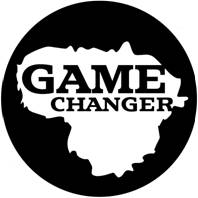
How can we make the world aware of Lithuania, its 50 years of nonviolant resistance against the USSR?
GameChanger: A film about Lithuania's nonviolent resistance
Ruta Musonis
This is great, Aage!!
David Zincavage
My grandfather came to America in 1912 after violently resisting the Russian Occupation.
Mia Pia
My grandparents and parents lost everything, due to the violent wars and occupation by the USSR.
Ida Hardy
We need a feature film like Hunting for Red October - but with more of the details of Lithuania. Or an epic romance featuring the beautiful countryside, following ten generations and what they saw in their lifetime. But whoever writes it please let there be a happy ending?
Aage Myhre
Rima Alessandra, please let Ida Hardy have some idea about your potential 'happy ending'
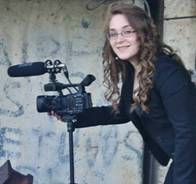
Rima Alessandra Gungor,
GameChanger Director, at the remaining barricade elements that still remain outside the Parliament as visible symbols of Lithuania's nonviolent revolution in 1991.
- Bookmark :
- Digg
- del.icio.us
- Stumbleupon
- Redit it
- Posted by - (1) Comment
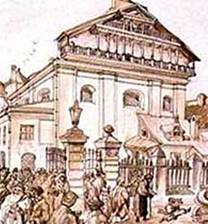
Israeli President Shimon Peres invited to head the advisory board for restoration of the Vilnius Great Synagogue
The government of Lithuania asked Israeli President Shimon Peres to head the international advisory board for the restoration of the Vilnius Great Synagogue.
“The [restoration] project is an important part of the effort to both preserve and restore Vilnius’ Jewish heritage, and I think that President Peres could bring valuable guidance and insight to our project,” Vilnius Mayor Arturas Zuokas said, according to the Baltic Review news site.
The comprehensive restoration and construction project could be completed as early as 2017, according to Tuesday’s report.
The offer came during a visit to Israel this week by Zuokas and Lithuanian Minister of Foreign Affairs Linas Linkevicius in which they met with Peres.
If Peres agrees, he would join Lithuania’s former President Valdas Adamkus, current Prime Minister Algirdas Butkevicius and the prominent architect Daniel Liebeskind, who are all members of the board.
The Great Synagogue in Vilnius was an icon of Lithuanian and Eastern European Jewish culture before it was ruined during World War II and demolished in the 1950s. From the 16th through the 20th centuries, it was among the best-known synagogues in Central Europe.
Read more...
___________________________________________________________________________________________
The Great Vilna Synagogue
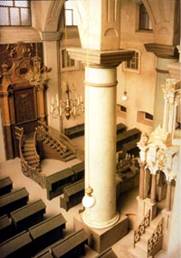
The Great Synagogue of Vilna which once stood at the end of Jewish Street in the centre of Vilnius (where today’s courtyard between Vokieciu Street and Stikliu Street is located), was built between 1630-1633 after permission was granted to construct a synagogue from stone. Standing on the spot of an existing synagogue built in 1572, the site had first been used to house a Jewish house of prayer in 1440.
According to legend it was so magnificent and impressive, Napoleon who stood on the threshold of this synagogue in 1812 and gazed at the interior was speechless with admiration. The synagogue had a number of entrances. One, at street level, consisted of a pair of iron gates which, had been donated by a tailors’ society in 1640. The other entrance on the western side, added in 1800, was a bit more imposing. An elevated two-tiered wooden gable with a portal and wrought iron posts. There was a heavy iron door with an original Hebrew inscription indicating it was a gift of a "society of Psalm reciters" in 1642.
Read more...
- Bookmark :
- Digg
- del.icio.us
- Stumbleupon
- Redit it
- Posted by - (0) Comment

Israeli President Shimon Peres invited to head the advisory board for restoration of the Vilnius Great Synagogue
The government of Lithuania asked Israeli President Shimon Peres to head the international advisory board for the restoration of the Vilnius Great Synagogue.
“The [restoration] project is an important part of the effort to both preserve and restore Vilnius’ Jewish heritage, and I think that President Peres could bring valuable guidance and insight to our project,” Vilnius Mayor Arturas Zuokas said, according to the Baltic Review news site.
The comprehensive restoration and construction project could be completed as early as 2017, according to Tuesday’s report.
The offer came during a visit to Israel this week by Zuokas and Lithuanian Minister of Foreign Affairs Linas Linkevicius in which they met with Peres.
If Peres agrees, he would join Lithuania’s former President Valdas Adamkus, current Prime Minister Algirdas Butkevicius and the prominent architect Daniel Liebeskind, who are all members of the board.
The Great Synagogue in Vilnius was an icon of Lithuanian and Eastern European Jewish culture before it was ruined during World War II and demolished in the 1950s. From the 16th through the 20th centuries, it was among the best-known synagogues in Central Europe.
Read more...
_____________________________
The Great Vilna Synagogue

The Great Synagogue of Vilna which once stood at the end of Jewish Street in the centre of Vilnius (where today’s courtyard between Vokieciu Street and Stikliu Street is located), was built between 1630-1633 after permission was granted to construct a synagogue from stone. Standing on the spot of an existing synagogue built in 1572, the site had first been used to house a Jewish house of prayer in 1440.
According to legend it was so magnificent and impressive, Napoleon who stood on the threshold of this synagogue in 1812 and gazed at the interior was speechless with admiration. The synagogue had a number of entrances. One, at street level, consisted of a pair of iron gates which, had been donated by a tailors’ society in 1640. The other entrance on the western side, added in 1800, was a bit more imposing. An elevated two-tiered wooden gable with a portal and wrought iron posts. There was a heavy iron door with an original Hebrew inscription indicating it was a gift of a "society of Psalm reciters" in 1642.
Read more...
- Bookmark :
- Digg
- del.icio.us
- Stumbleupon
- Redit it
- Posted by - (0) Comment
GameChanger
A film about Lithuania's
nonviolent resistance
By Aage Myhre
aage.myhre@VilNews.com
American-Lithuanian Rima Gungor (25) will reside in Lithuania throughout this summer to conduct a series of interviews and recordings that will crystallize in a movie planned launched to a worldwide audience in March 2014. The film bears the name GameChanger, and will shed light on Lithuania's postwar fights against occupying superpowers from the start of World War II until the final independence in the early 1990s. An important point will be Lithuanians remarkable nonviolent and successful uprising against the Soviet invaders in 1990-1991.
“Yes, the idea is to chronicle and analyze the history of resistance movements in Lithuania and show how and why they developed into the final and successful non-violent resistance movement,” she tells us.
“While at North Central College in Chicago I won a Richter grant which allowed me to research and complete a paper on Lithuania’s resistance movements. I wrote my thesis on nonviolent resistance movements and how they can be successful using Lithuania’s nonviolent movement as an example. The nonviolent resistance movement in Lithuania is one of the least recognized and least talked about freedom movements, however, it was one of the most successful in several decades.”
The film will analyze Lithuania’s freedom movements starting from the armed resistance during and after World War II, the protests during the 1960’s and 1970’s, and finally the nonviolent movement in the 1980’s and 1990’s. The goal is not only to tell Lithuania’s story, in a historical, but also personal and intimate way through interviews with participants both inside and outside of Lithuania, and to apply it to a global context to inspire other movements around the world.
- Bookmark :
- Digg
- del.icio.us
- Stumbleupon
- Redit it
- Posted by - (4) Comment
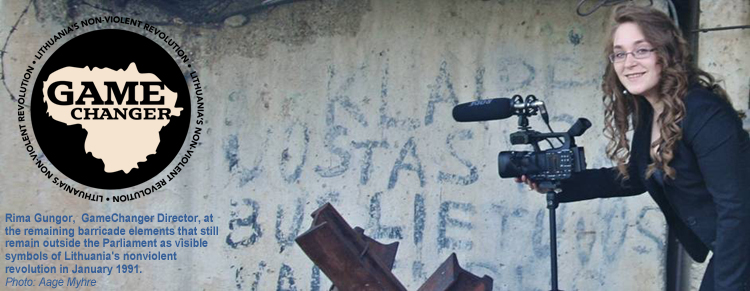
GameChanger
A film about Lithuania's
nonviolent resistance
By Aage Myhre
aage.myhre@VilNews.com
American-Lithuanian Rima Gungor (25) will reside in Lithuania throughout this summer to conduct a series of interviews and recordings that will crystallize in a movie planned launched to a worldwide audience in March 2014. The film bears the name GameChanger, and will shed light on Lithuania's postwar fights against occupying superpowers from the start of World War II until the final independence in the early 1990s. An important point will be Lithuanians remarkable nonviolent and successful uprising against the Soviet invaders in 1990-1991.
“Yes, the idea is to chronicle and analyze the history of resistance movements in Lithuania and show how and why they developed into the final and successful non-violent resistance movement,” she tells us.
“While at North Central College in Chicago I won a Richter grant which allowed me to research and complete a paper on Lithuania’s resistance movements. I wrote my thesis on nonviolent resistance movements and how they can be successful using Lithuania’s nonviolent movement as an example. The nonviolent resistance movement in Lithuania is one of the least recognized and least talked about freedom movements, however, it was one of the most successful in several decades.”
The film will analyze Lithuania’s freedom movements starting from the armed resistance during and after World War II, the protests during the 1960’s and 1970’s, and finally the nonviolent movement in the 1980’s and 1990’s. The goal is not only to tell Lithuania’s story, in a historical, but also personal and intimate way through interviews with participants both inside and outside of Lithuania, and to apply it to a global context to inspire other movements around the world.

Here is what Rima has to say about her background and reasons for making this movie:
While at college, I wanted to write about this part of Lithuania’s history in a broad sense, however I decided to narrow down the topic to the peaceful resistance movement in the 1980’s and 1990’s and use it as a successful example of Dr. Gene Sharp’s academic approach to nonviolent resistance. I used the grant toward a three week research trip to Lithuania. It had been almost four years since my last trip to Lithuania and my first time traveling internationally on my own.
In those three weeks, I had learned more about our history than from any book I had ever read. I really wanted an in-depth look at the peaceful resistance movement and to not only read about, but also discuss its success with those directly involved. During my research trip, I was lucky enough to interview Vytautas Landsbergis, Angonita Rupsyte, Dr. Gene Sharp, and many others involved in Lithuania’s independence struggle. These personal, face to face interviews helped me gain greater insight into how the peaceful resistance movement came to be and what factors led to the decision to remain nonviolent.
When the Soviets reoccupied Lithuania in 1944, Lithuanians decided to defend their nation by using force. That partisan resistance movement was severely crushed with impunity. The last partisan resistance fighter was caught and killed in 1956.

Many of the partisans fighting during Lithuania’s long and bloody ‘guerilla war of 1944-1953 were young men returning to Lithuania from the West to fight for their beloved home country. Here are three of them, with their official and nick names: K. Sirvys - "Sakalas", J. Luksa - "Skirmantas", B. Trumpys - "Rytis". Very few ‘Western partisans’ returned to their homes in Europe or the U.S.. Almost all of them were killed by the Soviets.
After the armed resistance movement ended, Lithuania went through a period of uncertainty with respect to resistance efforts in the 1960’s and 1970’s. Underground movements started to form and the human rights protests began, publicly highlighted by the self-immolation of Romas Kalanta in 1972. The groups that formed were not connected under one banner for some time due to differences in viewpoints and logistical issues. It was not until 1988 that a unified movement of diverse groups was formed under Sajudis. One point that was understood amongst all of the members was that nonviolent resistance was the method they would use to gain Lithuania’s freedom and independence. As Vytautas Landsbergis put it to me in our interview, “violence did not work in our favor the last time so we knew we had to try peaceful resistance. It was the only logical choice.”
The protest movement took on several public forms including large gatherings, public demonstrations, singing of Lithuanian cultural folk songs in the streets, throwing Soviet paraphernalia in piles in the streets, etc. Behind the scenes the work to organize and keep the movement moving forward was difficult and dangerous, especially since independence was not the end goal but the structure of the country under democratic guidelines was. Once independence was gained it would require even more commitment and hard work to maintain it.
Then came the night of January 13th, 1991, also known as the January massacre. At this point, Soviet tanks and soldiers had entered into Lithuania as a sign of aggression against Lithuania’s peaceful resistance movement. The people took to the streets, stood in front of the tanks, protested, but never once turned violent in any fashion. Soviet soldiers continued the act of aggression and ended up killing 13 civilians. Some were run over by Soviet tanks. It was a gruesome evening that only ended once Gorbachev was persuaded by members of his staff that it was best to end it. This act of aggression by the Soviet Union was not received well by the West. It showed the USSR to the world as the evil empire it was portrayed as.

I returned from my trip and immediately got to work. My uncle had to ship the 30 odd books I bought in this enormous box because I could not carry them home! I was absorbing as much about Lithuania’s history as I could in order to do it justice in my thesis. While I was in Lithuania, I decided to record all of my interviews on camera so it would be easier for me to integrate the quotations into my paper. About eight months later, I was sitting with my grandmother eating lunch when she paused for a moment and said, “Rima, you recorded all those interviews you did, correct?” I nodded and asked her if she wanted to see them. She replied, “Well of course, but I think the rest of the world just might want to see them too. You’re sitting on a pretty high mountain of history, you know.”
What she said stuck with me for about a year before I decided that it was finally time to do something. The catalyst was actually another documentary called The Other Dream Team. While that documentary focuses on the story of basketball and Lithuania, it also touched on the difficulties of Soviet occupation, the peaceful resistance movement, and Lithuania’s relentless push toward freedom. It was around that point in which I decided that it was time to tell our story. However, I didn’t just want to tell it to our community, I wanted to apply Lithuania’s success to a more global context and show others that peaceful resistance is a viable option to gain freedom and independence. And that rather than a glamorous, idealistic effort that succeeded by using songs it was a long, difficult, dangerous road requiring hard work discipline, commitment, and the will to move forward in spite of all the obstacles that could have brought it down.; that every sacrifice was worth it; and that every struggle for independence does not end with its declaration.
I took the plunge to make this documentary on March 20th of this year when we launched our Facebook page, website and Kickstarter page. The positive feedback has been overwhelming and with each interview I do reinforces my need to tell our story. I am also very lucky to have the dedicated team that I have. They are with me every step of the way and believe in this project as much as I do. Our Kickstarter page was fully funded four days early, making a little over $10,000 in about 27 days. We were thrilled and we know our second Kickstater round will be just as successful. Currently, we are wrapping up our North American interviews. We have filmed in Toronto, Chicago, Madison, Cleveland, Lansing and Seattle. We depart on June 10th to Lithuania to film interviews, collect archive footage, and film historical sites. We expect to return September 10th and immediately move into production to have the trailer ready for November of this year. We expect the film to be ready by March or April of next year. It has been an incredible experience so far and we cannot wait to continue our next part of the journey. To find out more, visit our website and Facebook page at www.gamechangerfilm.com and www.facebook.com/GameChangerFilmLT. We will have our new Kickstarter link on both pages once it’s ready. This Kickstarter round will go for three months instead of 30 days. We would like to thank everyone for their support of our endeavor!!
|
Rima Gungor (25) about her relations to Lithuania
I come from an old family. My family, the Tallat-Kelpsai, suffered as a result of the occupation. Part of my family experienced incarceration in the labor camps and deportation to Siberia, and the other part fled and were in displaced persons camps for five years while waiting for some country to take them in. In those days immigrants had to have a sponsor that guaranteed that they would not be a burden on the U.S., had to pass health exams, etc. so it could take quite a few years to be able to leave the DP camps. Once here the adjustment was not easy, especially for the dispossessed immigrants. They could not communicate with close family in Lithuania so they did not know for long periods of time what happened to them, they could not go home until Lithuania became free, and they were completely unfamiliar with the nation they had emigrated to with almost nothing. Although some of my family spoke English and were university educated, their education was not accepted fully by their new homeland which made making a living harder. And within a short time of being here, although not yet a citizen, one was drafted into the US Army, so the family lost an important member while beginning to put down roots. My family which remained in Lithuania struggled as exiles, and upon returning to Lithuania. Both parts of my family survived, struggled, and continued to be good as well as successful people. As a child, people in the U.S. did not ask me so much about Lithuania; it started more when I was a teenager and as I became older and went to university. Most of the time, I would speak about Lithuania in history or political science classes and at conferences where my paper was accepted, explaining the history, about the occupation and its relevance to and the impact on the international community. This year I will be presenting at the Baltic Studies conference in Estonia on the Lithuanian independence movements. Americans interest varied. There was greater interest when they knew someone who was Lithuanian, were basketball fans, or had read about it or seen a film and had questions. They are interested in hearing about Lithuanian basketball and its stars, swimming, and technology especially due to the success of GetJar. I usually stress the importance of Lithuania’s history the most, but also its achievements of the past 20 years, and its art, culture, and food- both in Lithuania and the diaspora. I talk about its beauty, the preservation of its historical landmarks, and nature reserves, the ocean and its beaches, its forests, its museums and unusual spots. I discuss its flaws and its strengths. I feel deeply connected to the culture - it has been a big part of my life for many years through folk dance, academics, cooking, reading, programs like LISS and Refresh Lithuania and family and friends. Lithuania means home wherever I may be.
|
- Bookmark :
- Digg
- del.icio.us
- Stumbleupon
- Redit it
- Posted by - (0) Comment
By Daiva Markelis, Charleston, Illinois
Professor of English at Eastern Illinois University
When I was growing up, my mother was always going on about her aristocratic roots. Her great-grandfather had been a Prussian plikbajoris. Bajoris comes from the word bajoras, meaning nobleman, while plik is a shortened form of plikas, or naked. A naked nobleman was one whose wealth had dissipated, usually through fiscal mismanagement augmented by an excessive fondness for liquor.
Not to be outdone, my father would counter with the claim that his surname—Markelis—was one of a kind. “Except for my siblings, no other Markelises roam the face of earth,” he’d add, as if we were dinosaurs.
I felt doubly blessed. Having a singular last name was just as special as being the great great-granddaughter of Prussian plikbajoriai.
- Bookmark :
- Digg
- del.icio.us
- Stumbleupon
- Redit it
- Posted by - (5) Comment
ANCESTRY
By Daiva Markelis, Charleston, Illinois
Professor of English at Eastern Illinois University
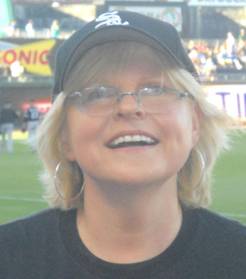
When I was growing up, my mother was always going on about her aristocratic roots. Her great-grandfather had been a Prussian plikbajoris. Bajoris comes from the word bajoras, meaning nobleman, while plik is a shortened form of plikas, or naked. A naked nobleman was one whose wealth had dissipated, usually through fiscal mismanagement augmented by an excessive fondness for liquor.
Not to be outdone, my father would counter with the claim that his surname—Markelis—was one of a kind. “Except for my siblings, no other Markelises roam the face of earth,” he’d add, as if we were dinosaurs.
I felt doubly blessed. Having a singular last name was just as special as being the great great-granddaughter of Prussian plikbajoriai.
As an adult, I never really questioned my father’s claim. In all of my formal and informal studies of Lithuanian history, literature, and linguistics, I never came upon the name Markelis. Decades of involvement in Lithuanian-American life and multiple visits to the homeland did nothing to dispel this notion of familial exclusivity—I never met another person bearing my last name.
Then, one morning, about a year ago, I logged onto Facebook to find the following message:
Hello Daiva Markelis, my apologies for not good english speach. But I just wanted to say, that its gratifieing to see people with same surnames. I have read some articles that you have wrote about Lithuania. It is great. Sorry, if I wasted some of your time.
The message was signed by a Rimantas Markelis. His Facebook photograph revealed a very fit, good-looking young man with the same dark eyes and intense expression of my father.
I thought I’d be disappointed to lose my unique Markelis status, but all I felt was curiosity and a tinge of existential relief.
We quickly friended each other and exchanged a few messages. I wrote in grammatically questionable Lithuanian, Rimantas in charmingly imperfect English:
I have never been in America but I think its much easier life, than in Lithuania. Its hard to find a job in these days, even if you have some graduates, everything depends how many friends you have in any institution.
I felt like writing back: “That’s pretty much the way it is in Chicago,” but held back.
Soon another Markelis popped up on Facebook. I assumed that Tomas was Rimantas’ brother. The idea that there might be more than two Markelis clans did not cross my mind until several weeks ago when I examined the FB pages of both and realized that not only do the two look nothing alike, but they also hail from different cities; Rimantas, who reminds me of my father, was born and raised in Alytus, halfway across the country from Dusetos, my father’s birthplace. Tomas, who looks nothing like my dad, lives in Rokiskis, a mere seventeen miles away from Dusetos.
My curiosity piqued, I decided to see what other Markelises had put down roots on Facebook. I thought there might be another two or three, and was shocked to discover thirty-one in all, the majority of them men. There were several Greeks—an Iraklis and Spiros and Grigoris. There was a Pablo Markelis, a lawyer who’d graduated from the University of Michigan and had gone to USC film school. Of course, there were plenty of Lithuanian names on the list: Mindaugas, Mintartas, Marius, Algedas, Rimgaudas, Darius, Egidijus, Arunas.
As for women, there was a Rosanna with rigid FB settings, an Alesia who was clearly Greek, and a woman I’ll call Elena. I thought Elena might be Lithuanian, but then discovered she’s from Buenos Aires and now lives in Florida. Her Facebook wall reveals that she is strongly pro-Israel and has a daughter who’s a member of the Board of Temple B’nai Brith. Elena may be related to Pablo. Although they are not FB friends, they have several Silvermans in common.
My searches on Facebook just whetted my appetite for finding more Markelises. The next step was Ancestry.com, because “you never know what you might learn about the past.” I have friends who love Ancestry—I’d always thought of them as individuals with too much time on their hands. I signed up for the free one-month trial and was hooked immediately. Ancestry revealed that one family of Markelises had immigrated to the U.S. from Lithuania in the early 1900s and settled in Massachusetts; another, in Pennsylvania. The Markelises on the first two pages of the Ancestry listing have Christian first names: Mary, Veronica, George, John, etc.
Further down the listing, I discovered a Yenca Markelis and Googled it only to learn on names.whitepages.com that “ZERO people in the United States have this name.” Soon after Yenca came a Yetta Markelis, then a Tavel and a Herschel and a Meyer, all from Lithuania. An entry simply labeled Markelis stated that the name appears on the Jewish Surnames List for the area of Minsk, Lithuania’s neighbor to the east. Khaim and Bassia Markelis had the following note appended to their names: Holocaust Refugees Relocated to Tashkent. And Boruchas Markelis, who died in 1920, was born and raised in Rokiskis, the same place as Tomas.
I’ve since learned that a variation of Markelis is Margelis. The letter k, when in the middle of a Lithuanian word, sounds almost like a g. Margelis would be a descriptive surname—margas in Lithuanian means colorful. Marge is also a very popular cow’s name, the Lithuanian equivalent of the American Elsie. So, maybe my father’s ancestors were a colorful lot. Or maybe they just owned a lot of cows.
Speaking of descriptive Lithuanian surnames—they are the most fascinating in the world, in my completely non-biased opinion. Among my favorites are Baltakis (white-eyed one); Baltaragis (white-horned one); Kairys (left-handed one); Repecka (one who crawls on all fours.) The name of tennis ace Ricardas Berankis presents an interesting nominal conundrum, since berankis means one without hands. And I imagine a forefather of the great basketball player Zydrunas Ilgauskas stretched out on the grass, relaxing. “Wow. You sure are long,” a passing villager exclaims, and thus a name is born.
Back to Markelis, or Margelis, which sounds a lot like Margolis, one of the most common Jewish surnames from Belarus, Lithuania, and northeastern Poland. When I researched the meaning of Margolis, I discovered that the name means ‘pearl’ in Hebrew. Ancestry.com qualifies this by stating that “the Hebrew word is ultimately of Greek origin, as in Greek margaron, margarites [for] ‘pearl’.”
When I told a Chicago friend with Eastern European Jewish roots about my possibly Jewish surname, I expected a modicum of surprise, perhaps even guarded approval. She just shrugged her shoulders and said something like “Oh, we’re all interconnected.”
Another friend, the writer Ellen Cassedy, whose wonderful We Are Here: Memories of the Lithuanian Holocaust serves as a model of genealogical research, wasn’t surprised when I told her what I had discovered about my name. “That's what occurred to me when you said you were searching,” she wrote in an email. “That the name could be Jewish. Or maybe German?”
I hadn’t even thought of German. Another avenue of research to pursue. Dusetos, my father’s birthplace, is not far from the Latvian border. Pockets of the country once had significant German populations. My father’s first name was Adolfas, the Lithuanian version of the very German Adolph, a popular name in the 1910s. And Markelis sounds like Merkel, as in Angela Merkel, the current German chancellor. I did a Google search of Merkel, which lead me to Markel. According to HouseofNames.com, Markel comes from the Germanic marah, or horse (mare); it’s probable that early Markels were servants who looked after horses.
Later in the same entry, however, the writer claims that the very first Markels lived in Prussia and were “one of the most notable families in the region” (emphasis mine.) The site sells a large number of Markel-related items, including a large, hand-painted plaque “proudly displaying the Markel crest” for $201.95. Those unwilling to shell out that kind of money can buy a mouse pad with the Markel coat-of-arms for $16.95 or a coffee mug for $13.95. I thought of buying the mouse pad, carefully inking in IS after the MARKEL, and showing off my coat-of-arms to envious friends.
What sweet irony it would be if my father had descended from the noble Prussian Markels—though that’s a pretty big if. The class differences between my aristocratic mother and more humble father were an occasional source of contention. “You Valaityte, you!” my father would spew as if it were an expletive when my mother criticized his rambunctious manner when he had too much to drink. My mother’s life of piano lessons and trips to Sweden and Traviata on New Year’s Eve stood in marked contrast to my father’s depressing childhood. He rarely talked about his past, except to say that his family was poor and his father drank and his mother was illiterate. Both were shipped off to Siberia despite their abject poverty and my grandfather’s collectivist politics. There was never any talk of my father’s grandparents. They were nameless individuals, probably deceased by the time my father was a boy.
What else I discovered about Markels from the internet: there are quite a few Jewish Markels, many of them living in Argentina. And Markel has over one hundred spelling variations, including Mark, Marcos, Marek, and Markowitz. The Internet Surname Database only lists a few, and Markelis isn’t one of them.
I often ask my college students what they’ve learned in the process of researching a paper topic: What do you know about your subject that you didn’t know before? What have you learned from this experience?
I ask myself the same questions.
I discovered that more Markelises roam the earth than were dreamt of in my philosophy.
I found I can spend hours on Ancestry.com, forgoing sleep and paper grading.
The existence of the Jewish Markelises confirmed my belief that although Lithuanian Christian and Lithuanian Jewish communities lived in highly segregated communities, there must have been points of intersection when more than a love of herring was shared.
I learned I might be of noble heritage on both sides of the family, which should give me some special privileges, such as discounts at Lithuanian restaurants.
More probably, however, I’m the descendent of people who looked after horses or raised cows. The percentage of commoners is much smaller than that of nobles, even in aristocrat-laden Lithuania.
- Bookmark :
- Digg
- del.icio.us
- Stumbleupon
- Redit it
- Posted by - (0) Comment
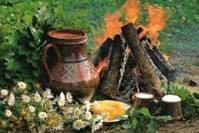
Lithuanian Midsummer
Midsummer Day is a festival of simple people, connected with the veneration of fire. Young girls adorn their heads with flower wreaths. A tall pole with a wooden wheel soaked in tar or filled with birch bark is hoisted at the top of the highest hill in the vicinity. Men whose names are Jonas (John) set the wheels on fire and make bonfires around it. In some places a second pole is hoisted with flowers and herbs. Young people dance round the fire, sing songs about rye, play games, men try to jump over the fire. The burning wheels on the poles are rolled down the hill into a river or a lake at its foot, men jumping over it all along. On the Midsummer Day people weed the rye and burn all the weeds.
On Midsummer Day's morning witches acquire special powers, they drag towels over the dewy grass to affect cows' milk. To save their cows from the witches' magic farmers shut them in cowsheds for the Midsummer Night and stick bunches of nettle in the door to scare the witches away. On Midsummer Day cows are driven out to pasture in the early after- noon when there is no more dew on the grass. Horses, however, are left to graze in the open throughout the night, or the witches magic has no effect on them.
On Midsummer Day dew has special healing powers. Young girls wash their faces in it to make themselves beautiful, older people do the same to make themselves younger. It is good to walk barefoot in dew on Midsummer Day's morning, for it saves the skin from getting chapped.
Midsummer Day and the time immediately preceding it is believed to have special powers. Medicinal herbs collected from June 1 to the Midsummer Day can cure 12 (some say 99) diseases.
Read more…
__________________________

Ida Hardy
What are YOU doing for this year's Solstice and Super Moon?
https://vilnews.com/2011-01-su-joninem
Boris Bakunas What a wonderful post! Thank you, Ida!
Sandra Abramovich Love this and am sharing it!
Ida Hardy Thank Aage Myhre - he's the original! It is a beautiful description isn't it? Are you doing something special?
- Bookmark :
- Digg
- del.icio.us
- Stumbleupon
- Redit it
- Posted by - (0) Comment

Air Lituanica launches ticket sales
![]()
Air Lituanica company with its partner, commercial flight operator Estonian Air, launches ticket sales to direct and connecting flights. Through an agreement with the Estonian airline, Air Lituanica will offer flights to more than 100 cities.
Air Lituanica will offer passengers three types of tickets. EcoTravel tickets are for budget travellers. Flexi Travel are for those who need flexibility – passengers can change the flight time of these tickets, if their travel plans change. Club type tickets are offered for flexibility and comfort seekers – Air Lituanica will offer them to wait for the flight in business class lounges, along with a quick safety check service, and if the travel plans change, tickets can be returned.
“As a result of commercial cooperation with Estonian Air, we begin ticket sales via Estonian Air ticket distribution channels,” says Erikas Zubrus, director of Air Lituanica. “Tickets are already available in ticketing systems, so tomorrow or in a few days at the latest travel agents begin offering them, while in the near future tickets will be available also on the Air Lituanica website”.
The first three Air Lituanica routes will be performed with Embraer 170 aircraft, hired by the company from Estonian Air. Connecting flights will be carried out by Estonian Air, or their partners, therefore, Air Lituanica can offer flights to over 100 cities.
From June 30, Air Lituanica will fly from Vilnius to Brussels. Flights will be daily, with departure from Vilnius at 18:30 and departure from Brussels – at 20:35. One way trip will last 2 hours 20 min.
From July 8, Air Lituanica will organize daily flights to Amsterdam. The plane will take off from Vilnius each morning at 6:25, and from Amsterdam to Vilnius – at 10:00. The journey time will be 2 hours 15 min.
From August 5, the Air Lituanica will launch flights from Vilnius to Berlin. Air Lituanica plane will depart on Mondays, Wednesdays, Fridays and Sundays from Vilnius at 13:55 and from Berlin – at 15:10. The flight will take 1.5 hours.
![]()
The goal of Air Lituanica is to offer convenient flights to the European and world cities for both business and tourist passengers. Up until 2015, the Air Lituanica’s flight route map will consist of 13-16 routes and there are plans to carry 500-600 thousand passengers every year, more than half of whom spend over 150 million litas a year in Lithuania. The airline operations will also create about 1,500 jobs in Lithuania.
More information:
Sandra Meškauskaitė
Communication Manager
Mob. +370 693 67485
sandra.meskauskaite@airlituanica.com
www.airlituanica.com
- Bookmark :
- Digg
- del.icio.us
- Stumbleupon
- Redit it
- Posted by - (0) Comment
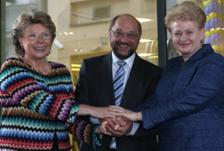
“Europe House” opened in Vilnius
President Dalia Grybauskaitė together with President of the European Parliament (EP) Martin Schulz and Vice-President of the European Commission (EC), Commissioner for Justice, Fundamental Rights and Citizenship Viviane Reding opened the Europe House in Gediminas Avenue in Vilnius. Under one roof here come all European Union institutions operating in Lithuania: the Representation of the European Commission, the Information Office of the European Parliament and the European Institute for Gender Equality. The Europe House will host an open for all visitors library, various seminars, meetings and discussions. Here one will find new publications, video and audio materials relating to the European Union.
_____________________________
President Dalia Grybauskaitė’s fourth State of the Nation:
We are again on the path of success

President Dalia Grybauskaitė delivered her fourth State of the Nation Address at the Seimas (Parliament). Inviting all to an open conversation about the place of Lithuania in the world and about the situation in Lithuania, the President underscored the contribution of the people to transforming Lithuania and initiating changes, and drew attention to new threats to national development. "After many challenges, we are once again on the path of success. This year the name of Lithuania resonated among the best European economists, investors, athletes, innovators, and many others. Europe and the world have recognized the efforts of our people. Lithuania - small as it is - is emerging as a country of great ability," the President said.
Read more...
_____________________________
Lithuania is taking over Presidency of EU Council from Ireland
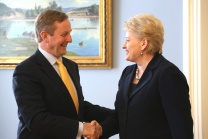
President Dalia Grybauskaitė met with the Taoiseach (Prime Minister) of Ireland, Enda Kenny. This meeting marks the final phase of Lithuania's preparations for the Presidency of the Council of the European Union. The President and the Irish Prime Minister discussed the goals achieved during the Irish Presidency and works left, as well as priorities of Lithuania which will soon take over the helm of the EU Council from Ireland. "Soon we will take over from Ireland the presidency of the EU Council. Our presidency will ensure the continuity of works as the priorities of Ireland and Lithuania are similar -EU's financial stability, economic growth and job creation, and openness to foreign partners. This is Ireland's seventh presidency of the EU Council, therefore we highly appreciate the support of the country with vast experience," the President said.
- Bookmark :
- Digg
- del.icio.us
- Stumbleupon
- Redit it
VilNews e-magazine is published in Vilnius, Lithuania. Editor-in-Chief: Mr. Aage Myhre. Inquires to the editors: editor@VilNews.com.
Code of Ethics: See Section 2 – about VilNews. VilNews is not responsible for content on external links/web pages.
HOW TO ADVERTISE IN VILNEWS.
All content is copyrighted © 2011. UAB ‘VilNews’.

 Click on the buttons to open and read each of VilNews' 18 sub-sections
Click on the buttons to open and read each of VilNews' 18 sub-sections 






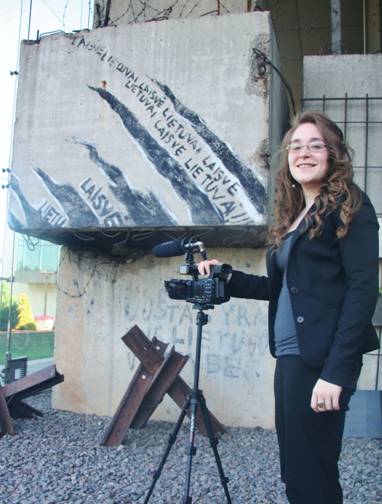










.jpg)



